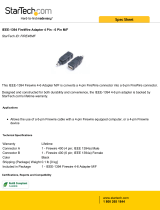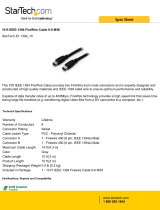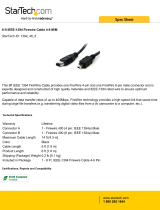SIIG USB 2.0+1394 DV Kit User manual
- Category
- Interface cards/adapters
- Type
- User manual
This manual is also suitable for

1
USB 2.0+1394 DV Kit
Quick Installation Guide
04-0288E
Introducing the USB 2.0+1394 DV Kit
The USB 2.0+1394 DV Kit is a complete DV editing kit --
a combo card with USB 2.0 and FireWire (1394a) interfaces,
deluxe DV editing software (full DV, AVI, QuickTime,
Windows Media, RealNetworks, and MPEG2 support)
and a 1394 6-pin/4-pin DV cable.
Features and Benefits
• Combo card design adds four USB 2.0 (480 Mbps)
and three 1394a (400 Mbps) ports into your system.
• Hot-swapping feature allows you to connect/
disconnect devices without first turning your system
off
USB 2.0 interface
• Adds three external and one internal USB 2.0 ports
• Compliant with USB specification rev. 2.0
• Supports high-speed (480 Mbps), full-speed (12
Mbps), and low-speed (1.5 Mbps) data transfer
modes for simultaneous operation of multiple USB
2.0/1.1 devices
Note: USB 1.1 devices are limited to USB 1.1 speeds
even when they are connected to USB 2.0 host adapter
or USB 2.0 hubs.
FireWire (1394a) interface
• Adds two external and one internal FireWire ports

2
• IEEE 1394-1995, P1394a (rev. 1.1) and OHCI Interface
Specification 1.0 compliant
• Supports serial bus data transfer rates of 100, 200
and 400 Mbps
System Requirements
• Pentium or equivalent computer with an available
PCI slot
• Windows 98SE/ME
• Windows 2000 (with SP 3) or later
• Windows XP (with SP 1) or later
• Windows Server 2003
Recommended system for DV capturing editing:
• Pentium III or above
• 128 MB RAM and CD-ROM drive
• 4 GB of available hard disk space
• Windows 98SE or later
Package Contents
• USB 2.0+1394 adapter
• 1394 6-pin/4-pin DV cable
• Driver CD
• Ulead VideoStudio DV editing software (deluxe
version)
• This quick installation guide

3
Board Layout
Figure 1. Board Layout
Power Connector
(optional)
USB 2.0 Port
USB 2.0
Ports
1394 Ports
1394 Port
Note: This power connector (same as the one
used with your floppy disk drive) is designed
to provide additional power to the board when
needed. This connection is optional. We
recommend to connect this power connector
when the following conditions occur:
- All ports are used.
- Device(s) not being detected.
In case you need to connect this power
connector, power off your system first before
making this connection.

4
Hardware Installation
General instructions for installing the card are provided
below. Since the design of computer cases and
motherboards vary, refer to your computer’s reference
manual for further information, if needed.
Static Electricity Discharge may permanently damage
your system. Discharge any static electricity build up in
your body by touching your computer’s case for a few
seconds. Avoid any contact with internal parts and
handle cards only by their external edges.
1. Turn OFF the power to your computer.
2. Unplug the power cord and remove your computer's
cover.
3. Remove the slot bracket from an available PCI slot.
4. Carefully align the card to the selected PCI slot push
the board down firmly, but gently, until it is well
seated.
5. Replace the slot bracket's holding screw to secure
the card.
6. Replace the computer cover and reconnect the power
cord.
Driver Installation
To ensure proper installation of this board, please follow
these instructions step-by-step.
Windows 98SE
1. Install the board, boot up the system, and insert the
driver CD.
2. When Windows boots up, at the Add New Hardware
Wizard window, click Cancel four times.

5
3. Click Start, then Run. Type in X:\setup.exe and
click OK. (Change X: to match your CD-ROM drive
letter)
4. Click Next, Next, at the Warning box click OK, then
click Finish to restart.
5. When the VIA ...Universal Host Controller is
detected, click Next.
6. Choose Search for the best driver... and click Next.
7. Clear all check boxes, click Next, Next, Next.
NOTE: If prompted for Windows 98SE Installation
CD, click OK. Insert this CD and click OK.
8. Click Finish.
9. When the VIA ...Universal Host Controller is
detected, click Next.
10. Repeat steps 6, 7 and 8.
11. When the USB Enhanced Host Controller is detected,
click Next.
12. Repeat step 6.
13. Clear all check boxes, click Next, Next, then Finish.
14. When the VIA OHCI IEEE 1394 Host Controller is
detected, click Next.
15. Repeat steps 6 and 13 to complete the installation.
Windows ME
1. Install the board, boot up the system, and insert the
driver CD.
2. When Windows boots up, at the Add New Hardware
Wizard window, click Cancel. Click No to decline
restart.

6
3. Click Start, then Run. Type X:\setup.exe and click
OK. (Change X: to match your CD-ROM drive
letter).
4. Follow the on-screen instructions to install the
driver. When prompted click Finish to restart.
5. At the Add New Hardware Wizard, choose
Automatic search for a better ..., click Next, then
click Finish.
6. Click Yes to restart Windows to complete.
Windows 2000
Windows 2000 Service Pack 3 (SP 3) or later is required
for this installation.
If you have have Windows 2000 Service Pack 4 (SP4) or
later installed, Windows will automatically detect and
install the correct driver for this board. Otherwise, follow
all steps below.
1. Install the board, boot up the system, and insert the
driver CD.
2. When Windows boots up, at the Found New
Hardware Wizard window, click Cancel.
3. Click Start, then Run. Type X:\setup.exe and click
OK. (Change X: to match your CD-ROM drive
letter).
4. Click Next, Next to accept the license agreement,
then Next to install the USB 2.0 driver.
5. Click Yes to confirm restarting the system
automatically.
6. Click Yes to accept Software License Agreement,
then click OK.
7. Click the Print to File icon, then click OK.

7
8. When Windows restarts, the drivers will install
automatically.
Windows XP/Server 2003
Windows XP Service Pack 1 (SP 1) or later is required for
this installation.
Windows XP Service Pack 1 or later will automatically
detect and install the correct drivers for this board.
Windows 2003 Server will automatically detect and install
the correct drivers for this board.
To Verify Successful Driver Installation
1. Check Device Manager to verify successful driver
installation.
Windows 98SE/ME: From the main desktop, right
click My Computer, then click Properties. Click
Device Manager tab.
Windows 2000/XP/Server 2003: Right click My
Computer, then click Manage. Click Device
Manager.
2. The drivers for this controller show up differently
under different versions of Windows. Please refer
to the correct Windows version to verify.
Windows 98SE/ME/2000 (with sp3):
a) Under the Universal Serial Bus Controllers:
- VIA PCI to USB Enhanced Host Controller
- USB 2.0 Root Hub
- VIA ... USB Universal Host Controller
- VIA ... USB Universal Host Controller
- USB Root Hub
- USB Root Hub

8
b) Under the 1394 Bus Controller or IEEE 1394 Bus
host controllers:
- VIA OHCI Compliant IEEE 1394 Host Controller
Windows 2000 (with SP4 or later):
a) Under the Universal Serial Bus Controllers:
- VIA ... Universal Host Controller
- VIA ... Universal Host Controller
- VIA USB Enhanced Host Controller
- USB 2.0 Root Hub
- USB Root Hub
- USB Root Hub
b) Under the IEEE 1394 Bus host controllers:
- VIA OHCI Compliant IEEE 1394 Host Controller
Windows XP (with SP1 or later)/Server 2003:
a) Under the Universal Serial Bus Controllers:
- VIA ... USB Universal Host Controller
- VIA ... USB Universal Host Controller
- VIA USB Enhanced Host Controller
- USB Root Hub
- USB Root Hub
- USB Root Hub
b) Under the IEEE 1394 Bus host controllers:
- VIA OHCI Compliant IEEE 1394 Host Controller

9
Ulead VideoStudio Software Installation
The USB 2.0 + 1394 DV Kit includes Ulead
®
VideoStudio
TM
digital video editing software for producing home videos
complete with attractive titles, transitions and sounds.
Before installing VideoStudio, make sure your adapter
and DV camcorder are properly installed and configured.
See next section, Connecting DV Camcorder, for more
details on how to properly install your DV camcorder.
1. Insert the Ulead VideoStudio DV software CD. Auto-
run should start automatically. If not, click Start,
Run, type in X:\Setup.exe, then click OK. (Change
X: to match your CD-ROM drive letter).
2. Select a language, click Next and follow on-screen
instructions to complete installation.
Note: For instructions on how to use Ulead
VideoStudio, please refer to VStudio.pdf file
located in the Manual directory on the Ulead
VideoStudio DV software CD.
Connecting DV Camcorder
Before setting up the digital video camcorder, make sure
to verify the driver for the adapter has been successfully
installed in your system and follow the setup procedures
listed below.
1. Boot up your system.
2. Connect the 4-pin connector of the provided
FireWire (1394) 6-pin/4-pin DV cable into your
digital camcorder, and connect the 6-pin connector
into an available port on the 1394 adapter. Power on
the camcorder. The camcorder should now appear
in Device Manager.

10
To Verify Successful DV Camcorder Setup
1. Check Device Manager to verify successful driver
installation.
Windows 98SE/ME: From the main desktop, right
click My Computer, then click Properties. Click
Device Manager tab.
Windows 2000/XP/2003: Right click My Computer,
click Manage, then click Device Manager.
2. Double click Imaging Device(s).
- A Microsoft DV Camera and VCR or DVCamcorder
should be displayed.

11
Technical Support and Warranty
QUESTIONS? SIIG’s Online Support has answers!
Simply visit our website at www.siig.com and click on Support.
Our online support database is updated daily with new drivers
and solutions. Answers to your questions could be just a few clicks
away. You can also submit questions online and one of our technical
support analysts will promptly respond.
This product comes with a lifetime manufacturer warranty. Please see
SIIG website for more warranty details. If you should happen to have
any problems with this product, follow the procedures below.
A) If it is within the store's return policy period, please return the
product to the store where you purchased from.
B) If your purchase has passed the store's return policy period, please
follow these steps to have the product repaired or replaced.
Step 1: Submit your RMA request.
Go to www.siig.com, click Support, then RMA to submit a
request to SIIG RMA. If the product is determined to be
defective, an RMA number will be issued. SIIG RMA department
can also be reached at (510)413-5333.
Step 2: After obtaining an RMA number, ship the product.
• Properly pack the product for shipping. All software, cable(s)
and any other accessories that came with the original package
must be included.
• Clearly write your RMA number on the top of the returned
package. SIIG will refuse to accept any shipping package, and
will not be responsible for a product returned without an
RMA number posted on the outside of the shipping carton.
• You are responsible for the cost of shipping. Ship the product
to the following address:
SIIG, Inc.
6078 Stewart Avenue
Fremont, CA 94538
RMA #:
• SIIG will ship the repaired or replaced product via Ground
in the U.S. and International Economy outside of the U.S. at
no cost to the customer.

USB 2.0+FireWire DV Kit is a trademark of SIIG, Inc.
SIIG and SIIG logo are registered trademarks of SIIG, Inc. Microsoft and Windows are
registered trademarks of Microsoft Corporation. Pentium is a registered trademark of Intel
Corporation. Other names used in publication are for identification only and may be trademarks
of their respective companies.
October, 2006 Copyright ©2006 by SIIG, Inc. All rights reserved.
About SIIG, Inc.
Founded in 1985, SIIG, Inc. is a leading computer upgrade manufacturer
of I/O connectivity products, including PCI & ISA serial and parallel
ports, USB, Serial ATA & UltraATA controllers, FireWire (1394a/b),
Networking, Sound Cards, and other accessories. SIIG is the premier
one-stop source of upgrades.
SIIG products offer comprehensive user manuals, many user-friendly
features, and are backed by an extensive manufacturer warranty.
High-quality control standards are evident by the overall ease of
installation and compatibility of our products, as well as one of the
lowest defective return rates in the industry. SIIG products can be
found in computer retail stores, mail order catalogs, and e-commerce
sites in the Americas and the UK, as well as through major distributors,
system integrators, and VARs.
PRODUCT NAME
USB 2.0+FireWire DV Kit
FCC RULES: TESTED TO COMPLY WITH FCC PART 15, CLASS
B OPERATING ENVIRONMENT: FOR HOME OR OFFICE USE
FCC COMPLIANCE STATEMENT:
This device complies with part 15 of the FCC Rules. Operation is
subject to the following two conditions: (1) This device may not cause
harmful interference, and (2) this device must accept any interference
received, including interference that may cause undesired operation.
THE PARTY RESPONSIBLE FOR PRODUCT COMPLIANCE
SIIG, Inc.
6078 Stewart Ave.
Fremont, CA 94538-3152
-
 1
1
-
 2
2
-
 3
3
-
 4
4
-
 5
5
-
 6
6
-
 7
7
-
 8
8
-
 9
9
-
 10
10
-
 11
11
-
 12
12
SIIG USB 2.0+1394 DV Kit User manual
- Category
- Interface cards/adapters
- Type
- User manual
- This manual is also suitable for
Ask a question and I''ll find the answer in the document
Finding information in a document is now easier with AI
Related papers
-
SIIG FireWire Adapter Installation guide
-
SIIG 3-Port FireWire PCI Card Installation guide
-
SIIG USB 2.0/1394 DV Kit Installation guide
-
SIIG 4-port USB 2.0 Installation guide
-
SIIG JU-CB1S12-S3 Installation guide
-
SIIG JU-000051-S1 Installation guide
-
SIIG 04-0205F User manual
-
SIIG 5 User manual
-
SIIG FireWire 800 DV Kit User manual
-
SIIG NN-PC2012-S4 Installation guide
Other documents
-
Micro Innovations USB425P Quick Installation Manual
-
 StarTech.com FIRE46MF Datasheet
StarTech.com FIRE46MF Datasheet
-
LogiLink PC0036A Datasheet
-
Digitus DS-33203-1 Owner's manual
-
DeLOCK 89106 Datasheet
-
Lindy 51058 User manual
-
 StarTech.com 1394_10 Datasheet
StarTech.com 1394_10 Datasheet
-
X-Micro FIREWIRE 1394 User manual
-
Sitecom FW-101 Datasheet
-
 StarTech.com 1394_46_6 Datasheet
StarTech.com 1394_46_6 Datasheet














